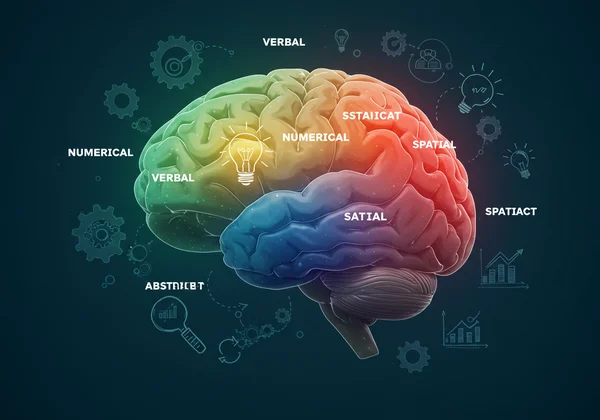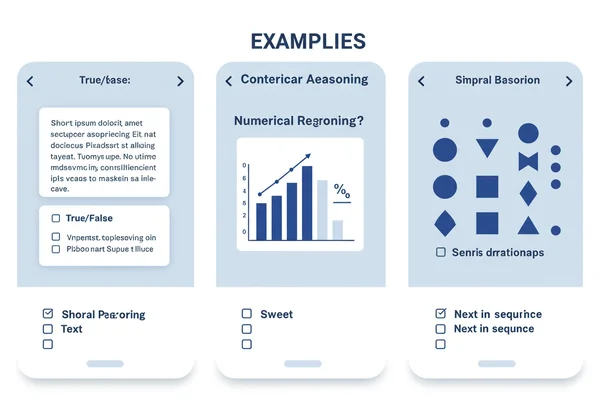แบบทดสอบความถนัดทางปัญญา: คู่มือของคุณในการทำความเข้าใจและประสบความสำเร็จ
September 7, 2025 | By Donovan Blackwood
การเผชิญหน้ากับ แบบทดสอบความถนัดทางปัญญา อาจเป็นเรื่องที่น่าหวาดหวั่น ไม่ว่าคุณจะเป็นผู้สำเร็จการศึกษาใหม่ ผู้เชี่ยวชาญที่กำลังมองหาบทบาทใหม่ หรือเพียงแค่ต้องการทำความเข้าใจจุดแข็งของตนเอง การทดสอบความถนัดคืออะไร และส่งผลต่ออาชีพของคุณอย่างไร? คู่มือฉบับสมบูรณ์นี้จะ อธิบายให้กระจ่าง เกี่ยวกับการประเมินอันทรงพลังเหล่านี้ โดยแสดงให้คุณเห็นอย่างชัดเจนว่าการทดสอบเหล่านี้วัดผลอะไร วิธีเตรียมตัว และวิธีที่คุณสามารถใช้ประโยชน์จากมันเพื่อปลดล็อก ศักยภาพสูงสุด ของคุณ การทำความเข้าใจความสามารถทางปัญญาของคุณคือขั้นตอนแรกสู่ความชัดเจนในอาชีพ และเครื่องมือที่เหมาะสมสามารถสร้างความแตกต่างได้อย่างมาก พร้อมที่จะดูว่าคุณยืนอยู่จุดไหนแล้วหรือยัง? คุณสามารถ ค้นพบศักยภาพของคุณ ด้วยการประเมินที่ออกแบบมาทางวิทยาศาสตร์
แบบทดสอบความถนัดทางปัญญาวัดผลอะไรบ้าง?
แบบทดสอบความถนัดทางปัญญาคือการประเมินมาตรฐานที่ออกแบบมาเพื่อประเมินความสามารถทางจิตของคุณในด้านต่างๆ แตกต่างจากการทดสอบที่วัดสิ่งที่คุณได้เรียนรู้ (การทดสอบความสำเร็จ) การทดสอบเหล่านี้มุ่งเน้นไปที่ศักยภาพในการเรียนรู้ ปรับตัว และแก้ปัญหาของคุณ นายจ้างจากหลากหลายอุตสาหกรรม ใช้แบบทดสอบเหล่านี้เป็นตัวบ่งชี้ที่เชื่อถือได้ของประสิทธิภาพในการทำงาน เนื่องจากให้ข้อมูลเชิงลึกที่เป็นกลางเกี่ยวกับความสามารถหลักของผู้สมัคร การทดสอบเหล่านี้ไม่ใช่การสอบผ่านหรือสอบตก แต่เป็นการระบุโปรไฟล์ทางปัญญาที่เป็นเอกลักษณ์ของคุณ

การสำรวจความสามารถทางปัญญาหลักที่ถูกประเมิน
แบบทดสอบความถนัดทางปัญญาที่ครอบคลุมจะประเมินทักษะทางจิตที่หลากหลาย การทำความเข้าใจ ด้าน เหล่านี้จะช่วยให้คุณเข้าใจภาพรวมความสามารถของคุณที่การทดสอบเหล่านี้ให้มาได้ดียิ่งขึ้น
การให้เหตุผลเชิงภาษาและความเข้าใจ
สิ่งนี้วัดความสามารถของคุณในการทำความเข้าใจและตีความข้อมูลที่เป็นลายลักษณ์อักษร มันประเมินคำศัพท์ ไวยากรณ์ และความสามารถในการสรุปผลเชิงตรรกะจากข้อความของคุณ ทักษะทางภาษาที่แข็งแกร่งมีความสำคัญอย่างยิ่งสำหรับบทบาทที่ต้องการการสื่อสารที่มีประสิทธิภาพ การเขียนรายงาน และการตีความนโยบาย
การคิดวิเคราะห์เชิงตัวเลขและการตีความข้อมูล
สิ่งนี้ประเมินความสามารถของคุณในการทำงานกับตัวเลข ตีความข้อมูลจากแผนภูมิและกราฟ และแก้ปัญหาทางคณิตศาสตร์ ไม่ใช่แค่การคำนวณเท่านั้น แต่เป็นการใช้ข้อมูลเชิงตัวเลขเพื่อทำการตัดสินใจที่มีข้อมูล ทักษะนี้มีความสำคัญอย่างยิ่งในสาขาต่างๆ เช่น การเงิน วิศวกรรม และการวิเคราะห์การตลาด
การคิดเชิงนามธรรมและตรรกะ
สิ่งนี้ประเมินความสามารถของคุณในการระบุรูปแบบ กฎเกณฑ์เชิงตรรกะ และแนวโน้มในข้อมูลที่ไม่ใช่ภาษา (รูปร่าง สัญลักษณ์) เป็นการวัดความสามารถในการแก้ปัญหาอย่างแท้จริง โดยไม่ขึ้นกับภาษาหรือภูมิหลังทางวัฒนธรรม การให้เหตุผลเชิงตรรกะสูงเป็นตัวบ่งชี้สำคัญของการคิดเชิงกลยุทธ์และมีคุณค่าอย่างมากในด้านเทคโนโลยีและการให้คำปรึกษา
การคิดเชิงมิติสัมพันธ์และการแก้ปัญหา
สิ่งนี้วัดความสามารถของคุณในการมองเห็นและจัดการรูปร่างสองมิติและสามมิติ มันจำเป็นสำหรับอาชีพในการออกแบบ สถาปัตยกรรม วิศวกรรม และแม้แต่การผ่าตัด มันสะท้อนถึงความสามารถของคุณในการทำความเข้าใจระบบที่ซับซ้อนและคิดอย่างสร้างสรรค์เพื่อหาทางออก
ทำไมนายจ้างจึงใช้แบบทดสอบความถนัดทางปัญญา
นายจ้างพึ่งพา แบบทดสอบ เหล่านี้ด้วยเหตุผลสำคัญหลายประการ ประการแรก พวกเขาให้การวัดความสามารถของผู้สมัครที่เป็นมาตรฐานและเป็นกลาง ซึ่งช่วยลดอคติในการจ้างงาน ประการที่สอง ผลการปฏิบัติงานที่ดีในการ แบบทดสอบความถนัดทางปัญญา เป็นตัวบ่งชี้ที่พิสูจน์แล้วถึงความสำเร็จในการทำงานใน บทบาทที่หลากหลาย มันบ่งชี้ว่าผู้สมัครสามารถเรียนรู้ได้อย่างรวดเร็ว ปรับตัวเข้ากับความท้าทายใหม่ๆ และแก้ปัญหาที่ซับซ้อนในการทำงาน สิ่งนี้ทำให้เป็นเครื่องมือที่มีค่าสำหรับการสร้างทีมที่มีประสิทธิภาพสูง การทดสอบความถนัดออนไลน์ สามารถให้คุณได้เห็นภาพรวมของสิ่งที่นายจ้างกำลังมองหา
ถอดรหัสประเภทคำถามแบบทดสอบความถนัดทางปัญญาที่พบบ่อย
การทำความคุ้นเคยกับประเภทคำถามที่คุณจะพบเป็นขั้นตอนสำคัญในการเตรียมตัว แม้ว่ารูปแบบจะแตกต่างกันไป แต่โดยทั่วไปแล้วจะอยู่ใน ด้าน หลักที่กล่าวถึงข้างต้น การฝึกทำแบบทดสอบความถนัดอย่างสม่ำเสมอ จะช่วยให้คุณคุ้นเคยกับรูปแบบเหล่านี้ เพื่อเสริมสร้างทั้งทักษะและความมั่นใจของคุณ
ตัวอย่างคำถามสำหรับแต่ละด้าน (ภาษา, ตัวเลข, นามธรรม)
เพื่อให้เห็นภาพที่ชัดเจนขึ้น ลองดูตัวอย่างที่เรียบง่ายบางส่วน:
-
การให้เหตุผลเชิงภาษา: คุณอาจได้รับข้อความสั้นๆ ตามด้วยข้อความ คำถามของคุณคือการพิจารณาว่าข้อความนั้นเป็นจริง เท็จ หรือไม่สามารถระบุได้ โดยพิจารณาจากข้อมูลในข้อความที่ให้มาเท่านั้น นี่เป็นการทดสอบความใส่ใจในรายละเอียดและความเข้าใจของคุณ
-
การให้เหตุผลเชิงตัวเลข: คำถามอาจนำเสนอ ตารางแสดงตัวเลขยอดขายของบริษัทในช่วงห้าปี คุณอาจถูกขอให้คำนวณเปอร์เซ็นต์การเพิ่มขึ้นของยอดขายระหว่างสองปีที่เฉพาะเจาะจง นี่เป็นการทดสอบความสามารถในการดึงและจัดการข้อมูลได้อย่างแม่นยำ
-
การให้เหตุผลเชิงนามธรรม: คุณอาจจะเห็นลำดับของกล่องห้ากล่อง ซึ่งแต่ละกล่องมีรูปร่างต่างๆ ที่เปลี่ยนแปลงไปตามกฎเฉพาะ คุณจะต้องเลือกกล่องที่ตามมาอย่างมีเหตุผลในลำดับนั้น เพื่อแสดงให้เห็นถึง ความสามารถในการจดจำรูปแบบ ของคุณ

ด้วยการทำความเข้าใจตรรกะเบื้องหลังคำถามเหล่านี้ คุณสามารถเข้าใกล้การทดสอบของคุณด้วยกลยุทธ์ที่ชัดเจน หากต้องการดูว่าคุณทำได้ดีแค่ไหนกับคำถามประเภทเหล่านี้ คุณสามารถ ทำแบบทดสอบฟรี และรับผลตอบรับได้ทันที
กลยุทธ์การเตรียมตัวแบบทดสอบความถนัดทางปัญญาที่มีประสิทธิภาพ
แม้ว่าความสามารถทางปัญญาจะเป็นส่วนหนึ่งที่ติดตัวมาตั้งแต่เกิด แต่ผลการปฏิบัติงานในการทดสอบเหล่านี้สามารถปรับปรุงได้อย่างมีนัยสำคัญด้วยแนวทางที่ถูกต้อง การเตรียมตัวแบบทดสอบความถนัดทางปัญญา ไม่ใช่การท่องจำข้อเท็จจริง แต่เป็นการลับคมทักษะการให้เหตุผลของคุณและพัฒนาพฤติกรรมการทำข้อสอบที่มีประสิทธิภาพ
การฝึกฝนข้อสอบจำลองและการบริหารเวลา
วิธีการเตรียมตัวที่มีประสิทธิภาพที่สุดคือการทำข้อสอบจำลอง สิ่งนี้ไม่เพียงแต่ทำให้คุณคุ้นเคยกับรูปแบบคำถามเท่านั้น แต่ยังช่วยให้คุณพัฒนาทักษะ การบริหารเวลา ที่สำคัญอีกด้วย แบบทดสอบความถนัดทางปัญญาส่วนใหญ่มีเวลาจำกัด ดังนั้นการเรียนรู้ที่จะจัดสรรเวลาเป็นสิ่งสำคัญ ใช้แพลตฟอร์มที่เสนอการฝึกฝนแบบมีเวลาจำกัดเพื่อจำลองสถานการณ์การสอบจริง เมื่อคุณทบทวนผลลัพธ์ ให้มุ่งเน้นไปที่การทำความเข้าใจ ว่าทำไม คุณถึงทำผิดพลาด แทนที่จะดูแค่คะแนนเพียงอย่างเดียว กระบวนการนี้ช่วยให้คุณระบุจุดอ่อนและปรับปรุงเทคนิคการแก้ปัญหาของคุณ

การทำความเข้าใจคำแนะนำและรูปแบบคำถาม
อย่าประมาทความสำคัญของการอ่านคำแนะนำอย่างละเอียด การตีความคำถามผิดพลาด เป็นข้อผิดพลาดที่พบบ่อยและหลีกเลี่ยงได้ ก่อนการทดสอบ ตรวจสอบให้แน่ใจว่าคุณคุ้นเคยกับรูปแบบคำถามต่างๆ เช่น ปรนัย จริง/เท็จ/ไม่สามารถระบุได้ และรูปแบบการลากและวาง การทำ แบบทดสอบความถนัดเพื่อประเมินอาชีพ ที่มีคุณภาพสูงสามารถช่วยให้คุณได้พบกับคำถามที่ออกแบบมาอย่างมืออาชีพหลากหลายรูปแบบ เพื่อให้แน่ใจว่าคุณพร้อมสำหรับทุกสิ่งที่จะเข้ามา
วิธีพัฒนาทักษะทางปัญญาของคุณเพื่อความสำเร็จในระยะยาว
นอกเหนือจากการเตรียมตัวสำหรับการทดสอบเฉพาะแล้ว คุณยังสามารถดำเนินการเพื่อ พัฒนาทักษะทางปัญญา เพื่อประโยชน์ ระยะยาวในสายอาชีพ ลองคิดว่าสมองของคุณเป็นกล้ามเนื้อ ยิ่งคุณท้าทายมันในวิธีที่ถูกต้องมากเท่าไร มันก็จะยิ่งแข็งแกร่งขึ้นเท่านั้น แนวทางระยะยาวนี้ไม่เพียงแต่ช่วยให้คุณทำคะแนนได้ดีในการประเมินเท่านั้น แต่ยังช่วยเพิ่มประสิทธิภาพในการทำงานในแต่ละวันของคุณอีกด้วย
การออกกำลังกายเพื่อกระตุ้นสมองและพฤติกรรมการเรียนรู้
มีส่วนร่วมในกิจกรรมที่ท้าทายความคิดของคุณ ปริศนาอย่าง Sudoku และอักษรไขว้สามารถลับคมการให้เหตุผลเชิงตรรกะและภาษาของคุณ การเรียนรู้ภาษาใหม่หรือเครื่องดนตรีสามารถปรับปรุงความจำและความยืดหยุ่นทางปัญญา สร้างนิสัยการอ่านบทความหรือหนังสือที่ซับซ้อนในหัวข้อที่ไม่คุ้นเคยเพื่อขยายฐานความรู้ของคุณและเพิ่มทักษะความเข้าใจของคุณ การกระตุ้นทางจิตอย่างสม่ำเสมอเป็นกุญแจสำคัญในการสร้างและรักษาสมรรถภาพทางปัญญา

บทบาทของการพักผ่อน โภชนาการ และการมีสติในการทำงานของสมอง
ความเป็นอยู่ที่ดีทางกายภาพของคุณเชื่อมโยงโดยตรงกับความเฉียบแหลมทางจิตใจของคุณ ตรวจสอบให้แน่ใจว่าคุณนอนหลับพักผ่อนเพียงพอ เนื่องจากเป็นช่วงเวลาที่สมองของคุณรวบรวมความทรงจำและประมวลผลข้อมูล การรับประทานอาหารที่สมดุลซึ่งอุดมไปด้วยกรดไขมันโอเมก้า 3 สารต้านอนุมูลอิสระ และวิตามินจะช่วยบำรุงสุขภาพสมอง สุดท้าย การฝึกฝนเช่นการมีสติและการทำสมาธิสามารถช่วยเพิ่มสมาธิ ลดความเครียด และเพิ่มความสามารถในการคิดได้อย่างชัดเจนภายใต้ความกดดัน ซึ่งเป็นข้อได้เปรียบที่สำคัญในระหว่าง แบบทดสอบความถนัด แบบจับเวลา
ความได้เปรียบของคุณในโลกที่แข่งขัน: ก้าวต่อไป
การทำความเข้าใจโปรไฟล์ทางปัญญาของคุณไม่ได้เป็นเพียงข้อได้เปรียบอีกต่อไป แต่เป็นสิ่งจำเป็นในตลาดงานที่มีการแข่งขันสูงในปัจจุบัน แบบทดสอบความถนัดทางปัญญาให้ข้อมูลเชิงลึกที่เป็นกลางและขับเคลื่อนด้วยข้อมูลที่คุณต้องการเพื่อทำการตัดสินใจในอาชีพการงาน ระบุจุดแข็งของคุณ และกำหนดเป้าหมายพื้นที่สำหรับการพัฒนา มันช่วยให้คุณแสดง ศักยภาพสูงสุด ของคุณให้นายจ้างเห็น และสร้างเส้นทางอาชีพที่สอดคล้องกับความสามารถตามธรรมชาติของคุณ
อย่าปล่อยให้ศักยภาพของคุณขึ้นอยู่กับโชคชะตา ก้าวต่อไปเพื่อสร้างความได้เปรียบในการแข่งขัน ทำแบบทดสอบความถนัดฟรีที่ได้รับการตรวจสอบทางวิทยาศาสตร์ เพื่อรับผลลัพธ์ของคุณทันที และปลดล็อกรายงานที่ขับเคลื่อนด้วย AI อย่างละเอียดที่นอกเหนือไปจากคะแนน โดยนำเสนอข้อมูลเชิงลึกส่วนบุคคลเพื่อนำทางเส้นทางสู่ความสำเร็จของคุณ
คำถามที่พบบ่อยเกี่ยวกับ แบบทดสอบความถนัดทางปัญญา
อะไรคือความแตกต่างหลักระหว่างแบบทดสอบความถนัดทางปัญญาและการทดสอบ IQ?
แม้ว่าทั้งสองจะประเมินความสามารถทางปัญญา แต่ก็มีวัตถุประสงค์ที่แตกต่างกัน การทดสอบ IQ มีวัตถุประสงค์เพื่อวัดความฉลาดทั่วไปเทียบกับค่าเฉลี่ยของประชากร แบบทดสอบความถนัดทางปัญญามุ่งเน้นการประยุกต์ใช้มากกว่า โดยออกแบบมาโดยเฉพาะเพื่อทำนายประสิทธิภาพในสถานที่ทำงานหรือการตั้งค่าทางวิชาการ โดยการประเมินทักษะที่เกี่ยวข้องกับงาน เช่น การแก้ปัญหาและการคิดเชิงวิพากษ์
แบบทดสอบความถนัดทางปัญญายากที่จะผ่านหรือไม่?
การทดสอบเหล่านี้มักจะไม่ให้คะแนนแบบ "ผ่าน/ไม่ผ่าน" แต่ผลลัพธ์ของคุณมักจะถูกนำไปเปรียบเทียบกับกลุ่มมาตรฐาน (เช่น ผู้สมัครคนอื่นๆ หรือพนักงานปัจจุบัน) ความยากเป็นเรื่องส่วนตัว แต่ด้วยการฝึกฝนและเตรียมตัว แบบทดสอบความถนัด ที่เหมาะสม คุณสามารถปรับปรุงประสิทธิภาพและความมั่นใจของคุณได้อย่างมาก
ฉันสามารถอ่านหนังสือเพื่อเตรียมแบบทดสอบความถนัดทางปัญญาได้หรือไม่ หรือเป็นความสามารถที่มีมาแต่กำเนิด?
คุณสามารถเตรียม แบบทดสอบความถนัดทางปัญญา ได้อย่างแน่นอน แม้ว่าความสามารถทางปัญญาบางอย่างจะเป็นพื้นฐาน แต่การฝึกฝนสามารถลับคมทักษะของคุณ เพิ่มความเร็ว และทำให้คุณคุ้นเคยกับรูปแบบคำถาม เป้าหมายของการเตรียมตัวไม่ใช่การเปลี่ยนแปลงความสามารถโดยกำเนิดของคุณ แต่เพื่อให้แน่ใจว่าผลการทดสอบของคุณสะท้อนถึงศักยภาพสูงสุดของคุณได้อย่างถูกต้อง
แบบทดสอบความถนัดทางปัญญาสามารถช่วยโอกาสทางอาชีพของฉันได้อย่างไร?
คะแนนที่แข็งแกร่งสามารถทำให้ใบสมัครงานของคุณโดดเด่นสำหรับผู้สรรหาบุคลากร นอกจากนั้น ข้อมูลเชิงลึกจากรายงานโดยละเอียด เช่น รายงานจากการ วิเคราะห์ที่ขับเคลื่อนด้วย AI ของเรา สามารถช่วยให้คุณเข้าใจจุดแข็งของคุณ ระบุเส้นทางอาชีพที่เหมาะสม และสื่อสารคุณค่าของคุณต่อนายจ้างที่มีศักยภาพได้อย่างมีประสิทธิภาพมากขึ้น
จะเกิดอะไรขึ้นหากฉันทำคะแนนได้ไม่ดีในแบบทดสอบความถนัดทางปัญญา?
ผลการทดสอบเพียงครั้งเดียวไม่ได้กำหนดความสามารถหรือศักยภาพในอาชีพของคุณ ใช้เป็นโอกาสในการเรียนรู้ วิเคราะห์ผลลัพธ์ของคุณเพื่อระบุพื้นที่ที่ต้องปรับปรุง คะแนนที่ต่ำกว่าที่คาดไว้ อาจบ่งชี้ถึงความจำเป็นในการฝึกฝนเพิ่มเติม หรืออาจชี้ให้เห็นว่าบทบาทเฉพาะที่คุณสมัครอาจไม่เหมาะสมกับจุดแข็งทางปัญญาตามธรรมชาติของคุณมากที่สุด ซึ่งจะนำทางคุณไปสู่โอกาสที่เหมาะสมกว่า